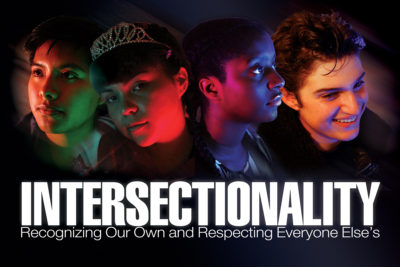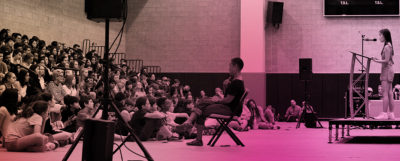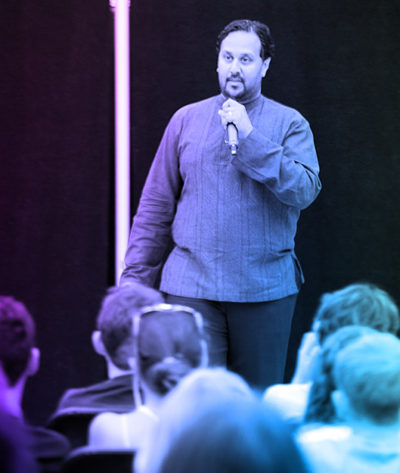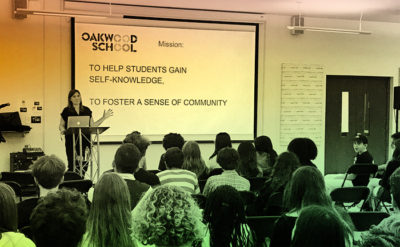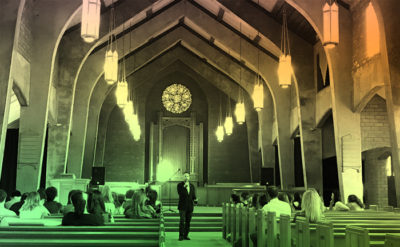On Wednesday, students’ regular schedules were altered so they could spend important time in Diversity Week Speaker Spaces and Workshops taking place in locations across campus. Held in the Sanctuary, Community Room, Theatre, and Lecture Hall, the four Speaker Spaces each featured a facilitator who spoke on a topic related to our Diversity Week theme of Intersectionality.
Jason David, Co-Founder of the Alliance of White Anti-Racists Everywhere Los Angeles (AWARE-LA) gave a talk titled “Beyond Shame and Guilt: Reimagining My White Identity.” Rabbi Heather Miller’s session, “From Human to Identity: A Case Study in Intersectionality,” followed her journey through the multidimensional world of identity formation and its societal implications, reflecting on her own experiences as a springboard for our own self-reflection. Matthew Craffey presented “It’s Complicated: Being a Log Cabin Republican in a Deeply Polarized America”, which focused on his experience as president of a group that advocates on behalf of LGBT Republicans. “Somewhere Over the Rainbow: (Re)Defining Power as a White Gay Man” was the name of the fourth Speaker Space facilitated by John Gentile, Co-Director of the Office for Identity, Culture, and Institutional Equity at the Horace Mann School. By sharing his experiences as a white cisgender gay man, he asks: how do the intersections of whiteness and gayness shape his story? He invited the audience to explore this inquiry and examine his historical and individual identities.
In addition to the above speakers, students attended a range of workshops throughout the day. Conceived and facilitated by students and teachers, these workshops covered a variety of ideas across the spectrum of cultural expression, identity, and politics such as Colorism Across Different Communities, Coming out of Two Closets—The Work of Julio Salgado, Environmental Destruction: Racism, Classism, and Sexism, How Equal is the Equal Protection Clause?, Immigration/Assimilation, Intersectionality in Pop Music, Responses to Hate Speech, Seeing Ourselves in Fiction: Novels and Intersectionality, Transgender 101: How Can Oakwood Be a More Inclusive School for Trans* Students?, and Understanding the Mujeres de Maiz.
Students and teachers hosted affinity breakout sessions during the week as well. These groups, self-selected by members of the community, included the following groups who respectfully and openly met for conversations and connections about their shared identities: Adopted Affinity; Asian; Asian Pacific Islander Heritage; Black, African Heritage; Exploring Identity Space; Greater Middle Eastern Heritage; Jewish Affinity; Latinx Heritage; Learning Differences Affinity; LGBTQ+; Multiracial Affinity; and White, European Heritage.
The workshops and affinity-based meetings that our students participated in were preceded by a Community Agreement outlining the goals, parameters, and intentions of Diversity Week. It states that Oakwood aims to create a learning community in which students and adults engage in a challenging educational experience as respectful community members. During Diversity Week, the views expressed by facilitators and speakers may not necessarily reflect personal views. Each member of the Oakwood community is in a different place with regard to their journey in understanding identity, diversity, equity, and inclusion. It is, therefore, asked that each member of the community shares their responsibility for holding themselves accountable to this community agreement that will allow for a shared experience that fosters the opportunity for understanding, respecting and connecting.
During the intense, sometimes difficult, and ultimately rewarding work of Diversity Week, every participant was guided by these ideals: to create a challenging experience, to maintain a safe and inclusive environment, to openly and honestly engage, to take risks and ask questions, to work collaboratively, to acknowledge that everyone (students and adults) are here to learn, to make a commitment to dialogue, to accept non-closure, and to realize that we are engaging in ongoing, life-long work.


